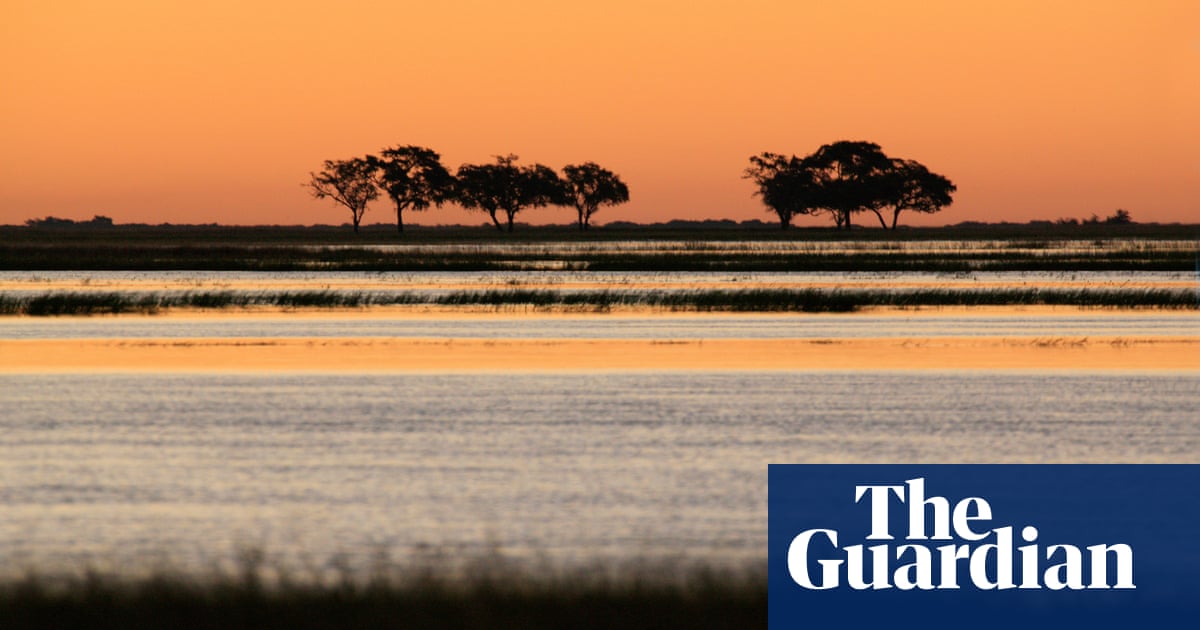Scientists bid to have traced the ancestral dwelling location of all residing folk to an lots of wetland that sprawled over noteworthy of fresh day Botswana and served as an oasis in an otherwise parched expanse of Africa.
The swathe of land south of the Zambezi River modified into a thriving dwelling to Homo sapiens 200,000 years ago, the researchers counsel, and sustained an isolated, founder population of fresh folk for as a minimal 70,000 years.
The community remained within the situation till a shift within the local weather, driven by changes within the Earth’s tilt and orbit, introduced rains to the north-east and south-west, producing lush inexperienced corridors that allowed the early folk to unfold into unique territories, the scientists tell.
“Now we have identified for a in actuality very lengthy time that up to date folk originated in Africa and roughly 200,000 years ago, but what we hadn’t identified till this see grow to be once where precisely,” mentioned Prof Vanessa Hayes, a geneticist and senior author on the see at the Garvan Institute of Scientific Analysis in Sydney.
The conclusions, which have raised eyebrows among some experts, are according to an prognosis of 1,217 samples of mitochondrial DNA, the genetic cloth in puny battery-admire mitochondria demonstrate in most cells. All of the DNA worn within the see got here from folk residing in southern Africa this day, in conjunction with the Khoisan, a population who be in contact with “click on” consonants and historically practiced foraging.
Hayes and her colleagues worn the mitochondrial DNA, which is passed down exclusively from mother to youngster, to plot out the oldest identified maternal line of folk alive this day. In accordance with their picture within the journal Nature, the so-known as L0 lineage and its sub-branches point support to an “ancestral dwelling” that spreads from Namibia across Botswana and into Zimbabwe.
The researchers subsequent modified into to geological, archaeological and fossil evidence to bag puny print concerning the local weather and broader ecosystem within the situation at the time. They came across that a body of water the scale of Unusual Zealand, known as Lake Makgadikgadi, once dominated the situation, but had began to interrupt up exact into a huge wetland 200,000 years ago. “It will perchance maybe maybe have been very lush and it would have supplied a appropriate habitat for contemporary folk and natural world to have lived,” Hayes mentioned.
In accordance with the DNA analyses, the L0 lineage split 130,000 years ago when a number of of the founder population moved north-east along a inexperienced vegetated route that spread out as rains soaking moist the arid land. A 2nd wave of migration headed south-west about 20,000 years later as rainfall also elevated vegetation in that route. Of us that headed north-east gave upward push to farming populations, while those that went south modified into coastal foragers, the scientists believe. “In actual fact, these ancestors have been the first human explorers,” Hayes mentioned.
Nevertheless other researchers are no longer convinced. “I’m indubitably cautious about utilizing up to date genetic distributions to infer precisely where ancestral populations have been residing 200,000 years ago, particularly in a continent as colossal and intricate as Africa,” mentioned Chris Stringer, who experiences human origins at the Natural History Museum in London. “Handle so many experiences that focal point on one puny bit of the genome, or one location, or one stone instrument industry, or one ‘serious’ fossil, it would possibly’t clutch the pudgy complexity of our mosaic origins, once other records are opinion to be.”
Stringer facets out that analyses of the male-inherited Y chromosome counsel our Y-carrying ancestors would possibly have originated from west Africa. Additional experiences, which have checked out total genomes, demonstrate populations who migrated out of Africa originating within the continent’s east. “These and loads other records counsel that we’re an amalgam of ancestry from a quantity of regions of Africa with, for sure, the addition of interbreeding from other human groups out of doors the continent,” he mentioned.
Sarah Tishkoff, a geneticist at the University of Pennsylvania, also raised doubts. “How can they know that there aren’t used lineages in other regions if they’re no longer integrated within the see?” she mentioned.
“It is no longer that you would possibly maybe presumably believe to gain inferences concerning the geographical beginning put of fresh folk in Africa basically based completely completely on patterns of variation in up to date populations. It is because folk migrate over lengthy distances. They migrated out of Africa and across the globe within the previous 80,000 years and they also’ve migrated across Africa within the fresh and feeble previous.”
Rebecca Ackermann, an archaeologist at the University of Cape Town, mentioned the see seemed to brush off in depth evidence that means the roots of our species are pan-African and previous. “Drawing sweeping conclusions about areas of beginning put from analyses of this puny segment of the favored genome is deeply problematic and outdated,” she mentioned.





Leave a comment
Sign in to post your comment or sign-up if you don't have any account.